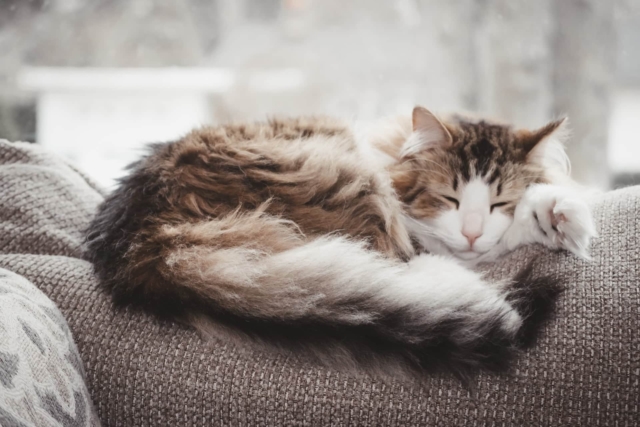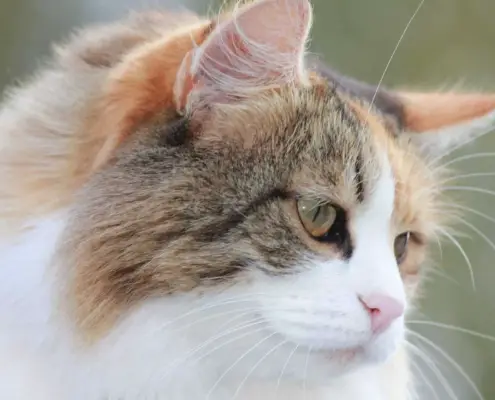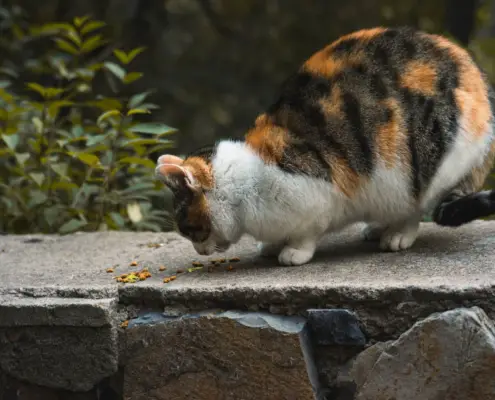
Cats are known for their love of sleep, spending an average of 12 to 16 hours a day snoozing away. But have you ever wondered why they sleep so much? Understanding your cat’s sleeping patterns is crucial in ensuring their overall health and well-being. By gaining insight into their sleep habits, you can provide them with a comfortable and safe sleeping environment. So, let’s delve into the fascinating world of cat naps and uncover the secrets behind their slumber.
Normal sleeping patterns for cats
It’s no secret that cats are champions of sleep. Their sleeping patterns differ from humans and other animals, as they are crepuscular creatures, meaning they are most active during dawn and dusk. Cats have evolved to conserve energy during the day to be alert and ready to hunt at night. They have a distinctive sleep-wake cycle, alternating between short periods of deep sleep and brief periods of wakefulness.
During deep sleep, your cat’s body relaxes, and their brain activity slows down. This is when you may notice them curled up in a ball, with their eyes tightly shut. They may twitch or move their paws during this stage, indicating that they are dreaming.
On the other hand, during their wakeful periods, cats are often alert and may engage in grooming, exploring their surroundings, or even playing. It’s important to note that these wakeful periods should not be mistaken for sleep disturbances but rather a natural part of their sleep-wake cycle.
Factors that affect a cat’s sleep
Like humans, cats’ sleep can be influenced by various factors. Understanding these factors will help you create an ideal sleeping environment for your feline friend. One significant factor is age. Kittens and senior cats tend to sleep even more than adult cats, with kittens requiring up to 20 hours of sleep a day.
Another factor that affects a cat’s sleep is their health. If your cat is experiencing pain, discomfort, or illness, it may disrupt their sleep patterns. Conditions such as arthritis or urinary tract infections can lead to restless nights for your furry companion. If you notice significant changes in your cat’s sleep patterns, it’s essential to consult your veterinarian to rule out any underlying health issues.
Moreover, environmental factors can impact your cat’s sleep. Loud noises, bright lights, or changes in their surroundings can disturb their slumber. Cats are sensitive creatures, and even a slight disruption can affect their sleep quality. Providing a calm and quiet space for your cat to sleep is essential in maintaining healthy sleep patterns.
Signs of sleep disturbances in cats
Just like humans, cats can experience sleep disturbances. Identifying these signs can help you address any sleep issues your cat may be facing. One common sign is excessive daytime sleepiness. If your cat appears lethargic or lacks energy during the day, it could indicate that their sleep at night is being disrupted.
Other signs of sleep disturbances include frequent waking during the night, restlessness, or excessive grooming. Cats may also exhibit irritability or aggression if they are not getting enough quality sleep. If you notice any of these signs, it’s important to investigate further and make adjustments to improve your cat’s sleep environment.
How to enhance your cat’s sleeping environment
Creating a comfortable and safe sleeping space for your cat is essential in promoting healthy sleep patterns. Here are some tips to enhance your cat’s sleeping environment:
- Provide a cozy bed: Cats love to curl up in warm and soft spaces. Invest in a comfortable cat bed that provides adequate support for their joints and muscles.
- Choose the right location: Find a quiet and secluded area in your home where your cat can sleep peacefully. Avoid placing their bed near noisy appliances or high-traffic areas.
- Control the lighting: Cats prefer dimly lit environments for sleep. Use curtains or blinds to regulate the amount of light entering the room.
- Minimize disruptions: Keep your cat’s sleeping area free from loud noises or sudden movements. Consider using white noise machines or calming music to drown out any disturbing sounds.
- Maintain cleanliness: Regularly clean your cat’s sleeping area to remove any dust or allergens that may affect their sleep. Wash their bedding regularly and provide fresh, clean water nearby.
By implementing these strategies, you can create an optimal sleeping environment that promotes restful sleep for your feline companion.
Cat sleep aids and products to improve sleep quality
If your cat is experiencing sleep disturbances, there are various sleep aids and products available to help improve their sleep quality. Here are a few options you can consider:
- Catnip: Catnip is a herb that has a calming effect on cats. It can be used to help them relax and unwind before bedtime. Sprinkle a small amount of dried catnip on their bed or toys to encourage them to sleep.
- Comforting scents: Certain scents, such as lavender or chamomile, have a soothing effect on cats. Use essential oil diffusers or sprays to create a calming atmosphere in their sleeping area.
- Calming pheromone sprays: Pheromone sprays mimic the natural pheromones that cats produce when they feel safe and secure. These sprays can help reduce anxiety and promote better sleep.
- Elevated beds: Some cats prefer sleeping in elevated positions, such as on a cat tree or window perch. Providing them with elevated beds can give them a sense of security and help improve their sleep quality.
Remember to consult with your veterinarian before introducing any sleep aids or products to ensure they are safe and suitable for your cat.
Establishing a bedtime routine for your cat
Just like humans, cats thrive on routine. Establishing a bedtime routine can signal to your cat that it’s time to wind down and prepare for sleep. Here are some tips for creating a bedtime routine for your feline friend:
- Set a consistent bedtime: Try to establish a regular sleep schedule for your cat. Cats are creatures of habit and will appreciate a predictable routine.
- Engage in playtime: Before bedtime, engage your cat in interactive play sessions. This will help tire them out and expend any excess energy.
- Provide a pre-bedtime snack: Offering a small meal or treat before bed can help satisfy your cat’s hunger and create a sense of comfort.
- Offer relaxation time: Spend a few minutes petting or grooming your cat before they settle down for the night. This can help them relax and feel secure.
By following a consistent bedtime routine, you can help your cat transition into a restful sleep and promote healthy sleep patterns.
Tips for dealing with sleep disruptions in cats
Occasionally, cats may experience sleep disruptions due to various factors. Here are some tips for dealing with sleep disruptions:
- Identify the cause: If your cat’s sleep is being disrupted, try to identify the underlying cause. Is there a new noise in the environment? Have there been any recent changes in their routine? Identifying the cause can help you address the issue effectively.
- Consult your veterinarian: If your cat’s sleep disturbances persist or worsen, it’s essential to consult your veterinarian. They can help determine if there are any underlying health issues or provide additional guidance on improving your cat’s sleep quality.
- Maintain a consistent routine: Cats thrive on routine, so it’s important to maintain a consistent sleep schedule and bedtime routine. This will help them feel secure and promote better sleep.
- Provide mental stimulation: Cats need mental stimulation to keep them engaged and prevent boredom. Provide them with puzzle toys or interactive play sessions during the day to help tire them out mentally and physically.
By implementing these tips, you can help your cat overcome sleep disruptions and promote healthy sleep patterns.
Promoting healthy sleep patterns for your feline friend
Understanding and enhancing your cat’s sleeping patterns is vital in ensuring their overall health and well-being. By providing a comfortable and safe sleeping environment, you can help your cat achieve the restful sleep they need. Pay attention to their sleep habits, identify any sleep disturbances, and make necessary adjustments to promote healthy sleep patterns.
Remember, cats are unique individuals, and their sleep requirements may vary. It’s important to observe your cat’s behavior, consult with your veterinarian when needed, and tailor their sleeping environment to meet their specific needs. By doing so, you can ensure that your feline friend enjoys many peaceful and rejuvenating cat naps.
If you have any questions or concerns about your cat’s sleep patterns, consult with your veterinarian for personalized advice and guidance.
If you enjoyed my article, I would appreciate you sharing it with your network.

Sima Ndlebe
Sima writes for CatBuzz. He is interested in Cats, Health and Fitness, and Entrepreneurship.
Published: 14 November 2023
Related Articles
Disclaimer
The content found on CatBuzz.org is presented on an "as is" basis and is intended for general consumer information and education purposes only. Any utilization of this information is voluntary and solely at the user's own risk.
None of the articles or content should be regarded as, or used in place of, veterinary medical advice, diagnosis, or treatment. The information provided on the website is purely for educational and informational intentions and should not be considered a substitute for professional guidance from a veterinarian or other qualified expert. The articles are designed to inform consumers about veterinary healthcare and medical matters that may impact their cat's daily life. It should be noted that this website and its services do not constitute the practice of any form of veterinary medical advice, diagnosis, or treatment. CatBuzz.org explicitly disclaims any liability for any direct or indirect damages or losses that may arise from the use of or reliance on the information contained within the content.
Consumers must consult a veterinarian, veterinary specialist, or another qualified veterinary healthcare provider when seeking advice regarding their cat's health or medical conditions. It is important not to ignore, avoid, or postpone seeking medical advice from a veterinarian or other qualified veterinary healthcare provider solely based on information obtained from this website. If you believe that your cat may be experiencing a medical issue or condition, it is imperative to promptly contact a qualified veterinary healthcare professional.




